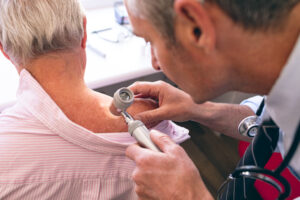Veterans seeking disability benefits often undergo Compensation and Pension (C&P) exams to assess the impact of their conditions. Leah talks about what to expect during a diabetes C&P exam, a prevalent condition among veterans. Understanding the process and the specific criteria examiners use is crucial for veterans navigating the disability claims process.

Types of Diabetes
Before talking about the C&P exam details, let’s briefly touch on the types of diabetes commonly seen in veterans. Type 2 diabetes, often known as adult-onset diabetes, is more prevalent. Type 1 diabetes, or juvenile-onset diabetes, can also affect veterans. The connection between diabetes and military service can vary, with diagnosis during service or within the first year of separation often having direct links.
Disability Benefit Questionnaire (DBQ)
The Disability Benefit Questionnaire (DBQ) is a vital document used by C&P examiners to gather information essential for determining rating criteria. Veterans can access these questionnaires on va.gov. For diabetes, the DBQ covers crucial aspects like diagnosis, treatment, and related complications. Now, let’s explore what to expect during a diabetes C&P exam.
Scheduling and Preparation
Once a veteran files a claim for VA disability, they typically receive a packet detailing the upcoming C&P exam. This packet specifies the examination platform—whether in person, over the phone, or virtually. It includes details such as the practitioner’s name, specialty, and the examination’s time and location. Veterans may also receive questions to fill out before the exam, providing examiners with additional context.
DBQ Overview
During the exam, examiners refer to the DBQ, discussing specific elements related to diabetes. They review the veteran’s medical records and may inquire about the official diagnosis, treatment regimen, and the impact on daily activities. Exam questions cover the frequency of diabetic care, hospitalizations, weight changes, and strength issues.
Secondary Complications
A crucial aspect of the diabetes C&P exam involves exploring secondary complications. Examiners inquire about conditions like peripheral neuropathy, erectile dysfunction, renal dysfunction, diabetic retinopathy, and more. If these complications are present, additional DBQs may be required to evaluate them separately.
Additional Inquiries and Physical Findings
The exam includes a catch-all block where examiners can note any other pertinent physical findings. Veterans may be asked about surgeries, scars, or other relevant details that could contribute to the overall assessment.
Tests and Diagnosis
Examiners review tests used in the diagnosis of diabetes, focusing on how, when, and based on what lab evaluations the diagnosis was made. This information aids in understanding the severity of the condition and its impact on the veteran’s ability to work.
Impact on Work Ability
The final section of the exam explores how diabetes affects the veteran’s ability to work. Veterans may be asked to describe the specific challenges they face, providing valuable insights into the practical implications of their condition.
Ratings and Criteria
Understanding how diabetes is rated is crucial for veterans seeking disability benefits. The current rating system, found in the 38 Code of Federal Regulations, outlines different levels of compensation based on the severity of the condition. Ratings can range from 10% to 100%, with criteria including but not limited to the management of blood sugar, the use of restricted diets, insulin injections, and the impact on daily activities. It is best to seek expert legal advisement from a Veterans Service Officer, Accredited Claims Agent or attorney for clarification if needed.
Conclusion
Navigating a diabetes C&P exam requires preparation and an understanding of the specific criteria examiners assess. Veterans should familiarize themselves with the DBQ, anticipate questions related to their diabetes diagnosis, and be ready to provide detailed information about the impact of diabetes on their daily lives. By actively participating in the exam process, veterans increase the likelihood of a fair and accurate assessment of their disability claim.
Also read: GERD and PTSD in Veterans Disability
At Prestige Veteran Medical Consulting, a veteran-owned company, we specialize in Independent Medical Opinions (IMOs) known as Nexus letters.
Our purpose is to empower YOU, the veteran, to take charge of your medical evidence and provide you with valuable educational tools and research to guide you on your journey.
Understanding the unique challenges veterans face, our commitment lies in delivering exceptional service and support.
Leveraging an extensive network of licensed independent medical professionals, all well-versed in the medical professional aspects of the VA claims process, we review the necessary medical evidence to incorporate in our reports related to your VA Disability Claim.
Prestige Veteran Medical Consulting is not a law firm, accredited claims agent, or affiliated with the Veterans Administration or Veterans Services Organizations. However, we are happy to discuss your case with your accredited VA legal professional.













